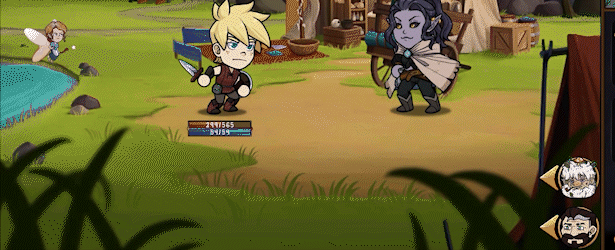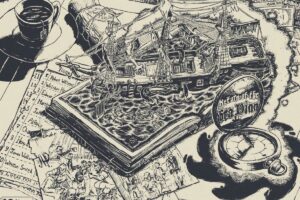Hero Tale is a delightful mix of RPG elements and idle gameplay, where players follow the adventures of a young hero who has gained a bit too much power without enough guidance. The game’s simplicity, combined with its engaging skill tree and uniquely designed enemies, has brought it a dedicated fan base. And its approach to monetization, which prioritizes an uninterrupted gaming experience, has set it apart in a crowded field. This post explores how Terra worked with the game’s development team to bring this fun medieval fantasy game to global audiences.
About Hero Tale
The game was developed by Weird Johnny Studio, a small but passionate team based in Poland. Known for their commitment to immersive gameplay, they’ve managed to carve out a niche for themselves in the competitive gaming industry. As an indie studio, Weird Johnny faces its share of challenges, from tight budgets to the inherent risks of self-publishing, so it has to be strategic about every decision it makes, including those around translation and adaptation.

Top row: Kamil Nieżorawski, Oskar Kłos, Paulina Michalska
Bottom row: Robert Śnieżyński, Barbara Drozd, Marta Stępkowska
Robert Śnieżyński, co-creator of Hero Tale, and Marta Stępkowska, the game’s art director, brought their previous experience in the idler genre to blend RPG elements into the game, shaping both its gameplay and visual appeal. Under Marta’s direction, 2D artists Oskar Kłos and Emilia Sieńko contributed to the game’s distinctive style, while Barbara Drozd, the studio’s animator, brought the enemies to life with her detailed animations. Kamil Nieżorawski, the game’s programmer, played a crucial role in ensuring smooth performance and integrating complex game mechanics. Additionally, Paulina Michalska, social media and community manager, also served as the localization coordinator.
Why Indie Developers Choose Localization
When Hero Tale started gaining traction during its Google Beta phase, the developers recognized that localization wasn’t just a box to tick—it was a critical investment in the game’s future. As requests for more languages began to flood in, the studio understood that by making Hero Tale accessible in multiple languages, they were opening the door to new markets and enhancing player engagement globally.

“Localization is not just a service; it’s an investment in your game’s longevity,” noted Paulina Michalska, the studio’s social media and community manager. “We saw how much it could affect player retention, and that’s why we decided to prioritize it early on. It wasn’t just about translation; it was about making sure every player, regardless of their language, could enjoy the game as we intended.”
The initial focus was on the FIGS languages (French, Italian, German, and Spanish) to gauge how new languages would impact player retention since players are more willing to check out a game if they see a store page in their native language. This approach paid off and led to the inclusion of additional languages as the game prepared for its Steam launch.
Localization Challenges and Solutions
Localizing this game, with its simple yet humor-laden story, presented unique challenges. While the narrative itself was straightforward, the developer’s team had concerns about how well the humor and puns—crafted in Polish—would translate into other languages. They also had questions about how the translations, with their different word lengths, might impact the game visually.
Terra’s strategy addressed the developer’s concerns directly and relied on careful coordination and precise technical management.
Setting the Foundation for Success
First, Terra had Weird Johnny Studio prepare .csv files with all the in-game text by categories. Then we processed the files using tools like memoQ and Gridly to ensure the text could be easily updated and imported into the Unity project. By selecting the right tools and working together, we were able to manage the game’s dynamic interface and keep the different word lengths in various languages from disrupting the game’s visual flow.

Using a Pivot Language for Efficiency and Consistency
To ensure that the charming and funny elements in the original script were preserved across all languages, we used English as the intermediary “pivot” language from which other translations were made. This approach required not only linguistic accuracy but also a deep understanding of Polish culture.
Building Shared Knowledge and Resources
The translators relied on quick responses from Paulina and her team to clarify doubts through query sheets and create translations that were as entertaining as the originals. Our team also built and managed a term base for Hero Tale, which was regularly updated based on feedback from the developers. This collaborative approach allowed for continuous improvement and adaptation and kept everyone on the same page.
Testing the Interface’s Flexibility
Finally, to check that the game’s interface could adjust to accommodate different languages, the teams ran an initial test that involved translating the English text back into Polish. “We made sure the interface changed dynamically to fit the number of characters,” Paulina explained. This testing phase was crucial in identifying potential issues and fine-tuning the integration process before translating the game from English into multiple target languages.

By embracing dynamic internationalization and fostering open communication with Terra, Weird Johnny Studio successfully brought their game to a global audience. And in a nod to the collaborative effort behind the game’s localization, they made the decision to credit all the linguists involved in the project. This gesture recognizes the importance of every contributor and honors our team’s commitment to quality and inclusivity.
Results and Impact

Players from different regions have expressed their appreciation for the added languages, which have significantly contributed to the game’s positive reception and increased its visibility in game stores. And the process of adding languages was much simpler than Paulina had anticipated: “Even if I was a single person coordinating localization in Weird Johnny Studio, it was never as scary or exhausting as I expected it to be.”
The studio is already working on their next project, Last Mage, which is set in the same universe as Hero Tale but 100 years later. With even more text and a more complex narrative, the studio is already planning how to incorporate the lessons learned from this experience into their future projects.
The Takeaway
This localization required careful planning, collaboration and a commitment to preserving the game’s unique charm. Weird Johnny’s close-knit team and hands-on approach to development allowed them to be agile and responsive throughout the process. And this agility was particularly evident in their ability to coordinate closely with our team, ensuring that every aspect of the game met their standards.
We hope that, as the studio continues to grow and develop new games, the lessons learned from this project will inform their efforts and make future localizations even more seamless!



